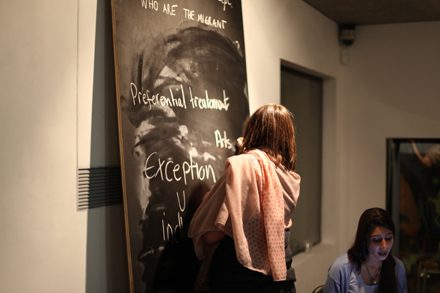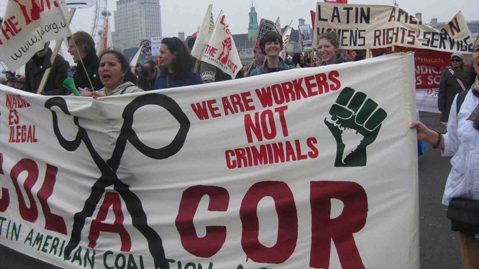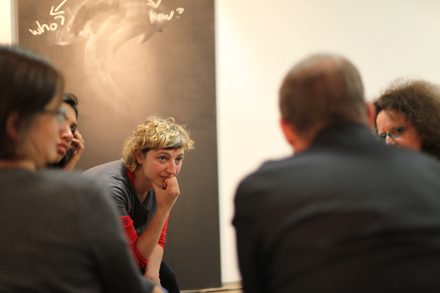
From ‘Who are the migrant workers today’
The first session of the ‘terms & conditions’ series focused on the question ‘Who are the migrant workers today? (mapping precarious labour)’ using it as a way into opening up the complex landscape of increasingly precarious labour market, where the most vulnerable, particularly migrants, are exposed to abuse, de-skilling and low pay under employment and dangerous working conditions.
The session opened with Dr Faiza Shaheen, who is an economist and the senior researcher with the New Economics Foundation, whose research and work is specifically focused on economic inequalities. She is the author of the report on the effect of the immigration cap ‘Why the Cap won’t fit’, which can be accessed here. Faiza brought really important stats into the picture –starting with the pay gap which is still present, male £8.56 and female £7.66 per hour, which showed how the labour market is deeply affected by gender as much as by migration, she also showed visually through her charts how the high salaries are getting higher and for those already on the low pay, they are getting even lower, the effect of it being, as Faiza used the term hollowing out of the middle.
Kevin Ward, Professor in Human Geography at the University of Manchester, and director of cities@manchester http://citiesmcr.wordpress.com/. mapped ways in which the labour market in the UK has changed in the last thirty years, with the restructuring of the public sector, expansion of low paying, poor quality private sector industries, and the turn towards contract and temporary labour market through the formalization of informal internal arrangements, ‘contracting-out’, all this resulting in increase of ‘non-standard’, often insecure or precarious employment forms, which affects those on the lower end of labour market, such as, but not exclusively, the migrants most. The term that Kevin used particularly stuck with me – workplace/out of place.

LAWAS Event
Jose Louis Sanches, from the Latin American Workers Association (LAWAS) introduced us to the work of the association –a migrant-led, self organising group of Latin-American working mostly in the service sector especially cleaning. Through self-organisation, education, collective actions and campaigns, the association’s mission is to expose and challenge exploitation and victimisation at the workplace. Jose Louis spoke of his own experience of working in the service industry, for employers such as west-end theatres and hospitals, who were paying below minimum wage, and would not meet the basic standards of health and safety. He also spoke of the deeply unjust practices of blackmail and threats of deportation by employers, using the precarious immigrations status of their employees would lower the wages and health & safety conditions. Jose Louis was part of the group of migrant workers who were detained, and six of his colleagues were deported, but with the support of LAWAS, other groups and IWW, he managed to get a solicitor and was released from detention.

LAWAS organises language exchange classes (English-Spanish), so if you are interested in joining-in please come every Saturday, from 10am to 12pm, Room L123b, London Road Building, 100-116 London Road, London South Bank University, SE1 6LN.
Precarious Workers Brigade, a UK-based growing group of precarious workers in culture and education, after a brief introduction, created three working groups, in order to discuss and organise a response to three issues/questions. One group worked on a response to the new troubling development of the Arts Council becoming a ‘Designated Competent Body of the Home Office’, with the power to ‘assess applications from artists applying for Tier 1 visas to enter UK on the basis of their exceptional talent’. http://www.artscouncil.org.uk/about-us/tier-1-visas/ Second group talked about ways in which cultural sector workers can forge solidarity links and campaigns with workers in other sectors, and the third group discussed ways in which ‘embarrassment’ can be used as a campaigning tool.
To find out more about the collective Precarious Workers Brigade and to join in, please see http://precariousworkersbrigade.tumblr.com/

The combination of talks, discussions and workshop shifted the event into more of a hands-on session, with the issues we started mapping turned into questions around how do we address these unjust conditions, how to build solidarities and networks that go beyond our immediate concerns, but are linked by deepening of precarious conditions in which we labour and live.
Find out more about terms & conditions – there is also audio recordings of the speakers and photos of the events available on the project web page.